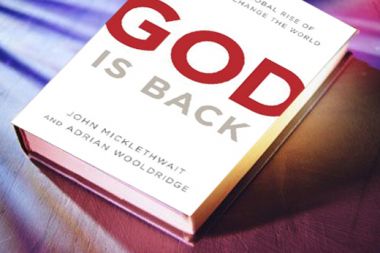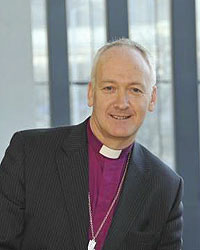God is Back: It's time society caught up

A couple of hundred years ago, the leaders of the Enlightenment were convinced they'd soon see the back of religion. The French Philosophes and their acolytes across Europe, America and further afield were so sure of the victory of 'rationality' over faith that they even built temples to celebrate. The high priests of positivism, Auguste Comte, Herbert Spencer and the rest would have been utterly baffled by the contemporary world.
The secularisation thesis (the idea that the world was getting less and less religious) has been proven erroneous – there are more religious believers worldwide than ever before. More than that, though, as the authors of the 2007 book God Is Back argue: "Modernity has not succeeded in casting the religious out of people's lives." Indeed, say Micklethwait and Wooldridge, "Secularisation has not pushed religion into the exile of the private realm."
The core of God is Back is simple – it assesses just how and why religion is still so prevalent around the world. What the Enlightenment's leading lights (and their progressive descendents in post-war sociology departments) didn't realise was that, for good or ill, faith is an integral part of lives, communities and societies around the world. It will take an almighty change of direction for faith to disappear.
This being the case, it's pretty astonishing that religious literacy is so low in the UK and the US. This shows itself in a number of ways.
Witness the complete lack of competent analysis of George Galloway's by-election victory in Bradford in 2012. The ranting demagogue, mouthpiece of dictators, would not have gained his victory were it not for his astute understanding of how the Muslim community in Bradford West felt disenfranchised. Indeed, the victorious Galloway saluted his supporters with cries of, "All praise to Allah!" No one saw this huge political upset coming because religious reporting has been consistently relegated to a minority pastime.
It isn't just Islam. The ignorance of Christianity in society at large and in the media as a whole is widespread. We're so used to polls telling us that children have no idea of the basic Bible stories that we barely bat an eyelid when told, "Nearly a quarter of children (23 per cent) had never read, seen or heard Noah's Ark, along with 25 per cent for the Nativity, 38 per cent for Adam and Eve and 43 per cent for the Crucifixion."
Even those 'in the know' seem to be failing when it comes to religious literacy. Commentator Douglas Murray wrote a piece this week bemoaning the lack of religious literacy in the UK. Yet in the first line, he referred to Holy Saturday as 'Easter Saturday'. The two things are not the same – Easter Saturday comes a week after Holy Saturday – the day between Good Friday and Easter Day itself. On one level this is a harmless mistake – the force of his argument was that we need to understand Islam better. But to make such a rudimentary error on a basic matter of Christianity did make me question just how much of an expert he was in matters religious.
It goes right to the top. David Cameron was ridiculed last year for suggesting Easter is all about, "hard work and responsibility." Aaqil Ahmed, the BBC's head of religion and ethics, recently suggested some of our most well-known cultural artifacts soon won't make sense. "If you tried to make Life of Brian today it would fall flat on its face because the vast majority of the audience would not get most of the jokes. They don't have the knowledge," Ahmed told the Independent. He questioned whether modern audiences would appreciate that the "great joke about the Sermon on the Mount" in the 1979 Python film, where a woman asks "What's so special about the cheesemakers?" was a reference to Jesus's words "Blessed are the peacemakers."
Though there are some exceptions (the fantastic work of Theos, for example, along with some good religious broadcasting) you really know things have got bad when atheist-in-chief Richard Dawkins says we should be teaching children more Bible stories.

To compound the lack of religious literacy, many national newspapers have ditched their religious correspondents. This may finally be reversed – The Guardian has recently appointed a new religious correspondent. Still, though, the media as a whole is full of white, liberal, middle class people who seem to know or care little about religion.
It's a point which has been repeatedly and effectively made by the Bishop of Leeds, Rt Rev Nick Baines. In one of his many excellent contributions to this subject, Baines says: "Questions of religious literacy in media and politics are being articulated more loudly by the day. It is a truism that is almost embarrassing to articulate, but you can't understand the world (or art or literature or history or just about anything else that comes under the bracket of 'human') without understanding religion."
This is what's at stake here. We can't understand what it means to be human without understanding faith. That doesn't mean we need mandated worship everywhere we turn. It does mean far better engagement with matters of faith from our education system, media, and wider public square.











